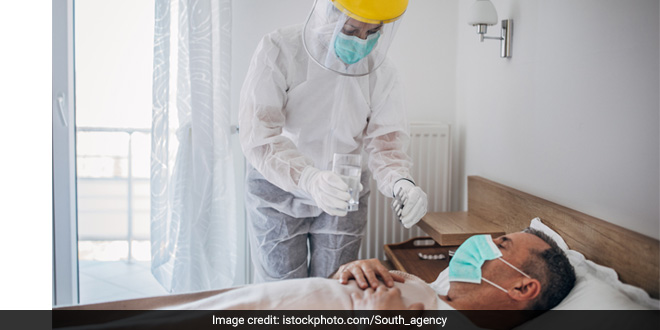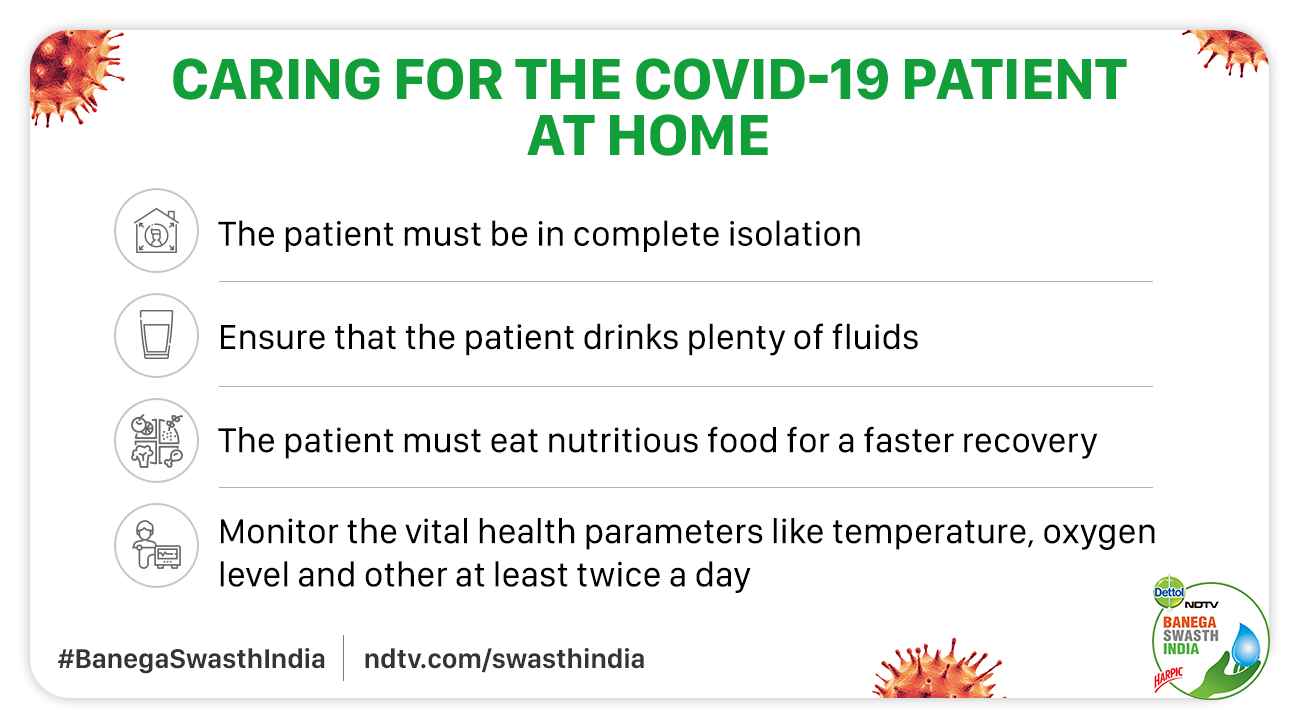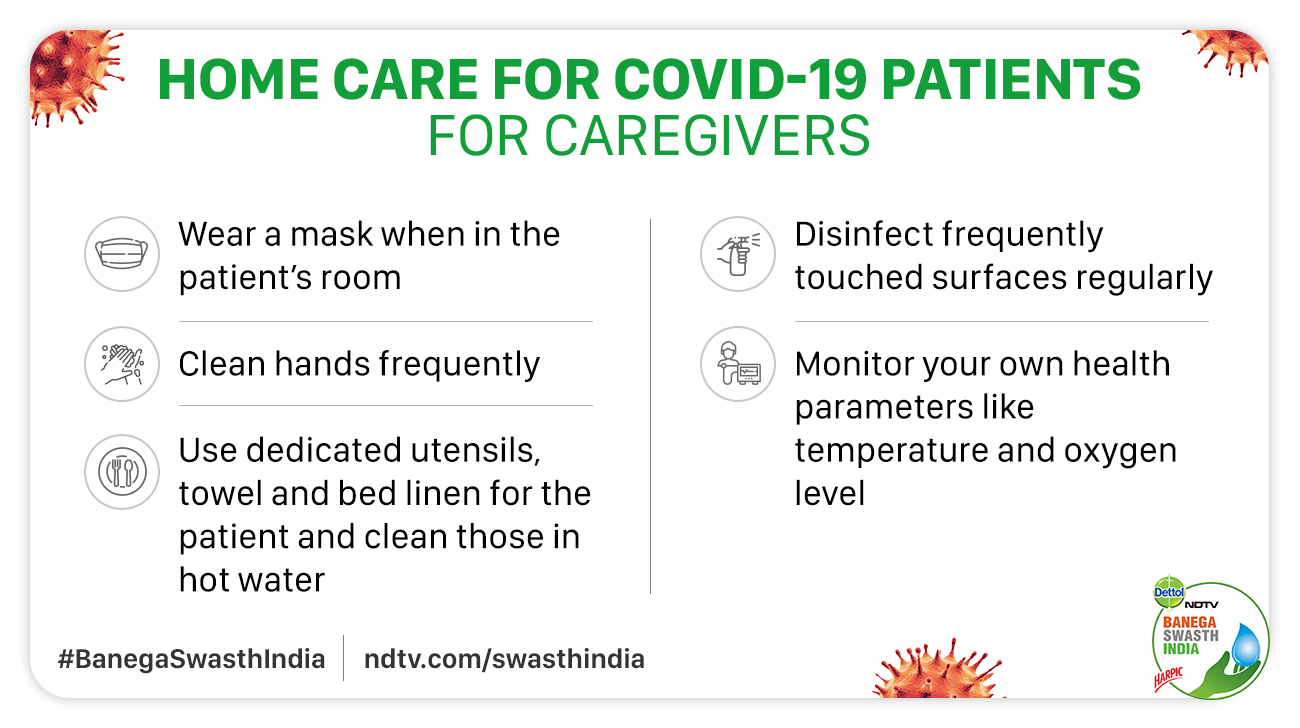Highlights
- Those patients who have stable condition can be managed at home: Experts
- COVID-19 patients must remain fully isolated at home, say experts
- Experts recommend following strict hygiene while looking after a patient
New Delhi: As the COVID-19 pandemic rages on and the number of new cases continues to be among the highest in the world health authorities in the country and international health agencies like the World Health Organisation (WHO) and Centres for Disease Control and Prevention (CDC) have agreed that patients with mild or no symptoms can be self-isolated and treated at home or in a non-healthcare setting. NDTV spoke with experts to learn about how the household can provide care to the COVID-19 patient at home while keeping themselves safe from the highly contagious coronavirus.
Who can be treated at home?
According to Dr. Vishal Sehgal, Medical Director, Portea Medical, a private healthcare firm, the government guidelines allow patients who are asymptomatic or mildly symptomatic to be managed at home. He further added,
Patients who have severe symptoms like problem in breathing cannot be managed at home and must seek medical supervision at a COVID-19 centre or hospital as early as possible. However, patients who do not have the risk of developing COVID related complications and have mild symptoms such as fever, sore throat, body ache with normal oxygen saturation and normal respiratory rate can be managed well at home.
He further said that earlier, the government’s guidelines said that COVID-19 patients who have co-morbid conditions which refer to the presence of one or more additional physiological or psychological conditions like hypertension, diabetes, liver-issues among others could be managed only at hospitals or COVID care centres. However later on the guidelines were modified and those patients who had stable co-morbidities were allowed to be managed at home. Similarly, there was an age criterion earlier under which patient below the age of 10 years and above the age of 60 years were to be treated at the hospital only. This criterion now holds true only for those who have severe symptoms while the rest of the people in these age groups can receive the treatment being in home isolation.
Dr Vandana Boobna, Senior Consultant, Internal Medicine, Max Super Speciality Hospital, Shalimar Bagh, Delhi said that patients can be well taken care of at home. She asserted,
Most patients suffer from asymptomatic to mild disease and recover well and not every patient requires admission and they can be well taken care of at home only, under the guidance of a physician and supporting care of caregiver at home. However, this needs strong vigilance, monitoring and continuum of care under the guidance of a physician.
Caring For The COVID-19 Patient At Home
The first step towards taking care of a COVID-19 patient at home, according to experts, is to have them in complete isolation. They recommend the patient to stay in a properly ventilated separate room with a bathroom that is dedicated for the patient only. According to Dr. Sehgal,
Home treatment is applicable to only those households that have a provision of a separate room and a dedicated bathroom for the COVID-19 patient, away from others. The patient is required to stay in isolation for 17 days which includes 10 days of treatment and 7 days of post-COVID quarantine to monitor the symptoms before letting the patient come out.
#COVID19 home-caregivers:
Ensure ill person rests, drinks plenty fluids & eats nutritiously
Wear????when in same room
Clean????frequently
Use dedicated????️????towel & bedlinen for ill person
Disinfect surfaces touched by ill person
????healthcare facility if person has difficulty breathing pic.twitter.com/5TphNdYMC9— World Health Organization (WHO) (@WHO) March 31, 2020
Dr. Boobna highlighted that while nursing a COVID-19 patient at home, the caregiver must focus on the patient’s liquid intake. She said that adequate hydration is extremely important for faster recovery from COVID-19. Along with proper hydration, she recommends a healthy diet that is rich in proteins and vitamins and proper rest. She also recommends following strict hygiene while caring for a COVID-19 patient at home.
She added that temperature, pulse and oxygen saturation of the patient must be checked twice a day and the physician looking after the case must be kept informed with the statistics.
According to Dr Vivek Pal Singh – Sr Consultant, Internal Medicine, BLK Super Speciality Hospital, Delhi the caregiver needs to ensure that the COVID-19 patient at home has an oxygen level that is more than 96 per cent and respiratory rate less than 16 per minute in the resting state.
Also Read: COVID-19 Explainer: What Is Far UV-C Light, And Can It Kill The Coronavirus On Surfaces?
The Caregiver Must Monitor Their Own Health As Well: Experts
With the COVID-19 patient in complete isolation, the rest of the family members need to go into quarantine, say experts. Dr. Sehgal said,
No person from the house of a COVID-19 patient should go outside the house. This means that the family members need to make arrangements for groceries and other necessary items in such a way that there is no interaction with people outside.
He suggests that there should be only one family member designated with the task of taking care of the patient. While talking about the dos and don’ts to be followed by the caregiver, Dr. Sehgal said,
The caregiver must wear a mask all the time. They should ensure that they have a pair of disposable gloves on while handling the utensils or laundry of the patient. The caregiver must maintain a physical distance of at least six feet from the patient and must enter the room if necessary.
He further said that all frequently touched areas of the house like doorknobs, light switches, TV remotes, cabinets, kitchen counters and other items and places should be disinfected regularly.
Dr. Sehgal recommends that all caregivers and other family members must monitor their own health and vital parameters like temperature, heart rate and oxygen level at least twice a day. In case, any family member exhibits symptoms, they should seek their doctor’s opinion immediately.
According to Dr. Boobna, the caregiver must contact a doctor immediately if he or she experiences any of the following symptoms:
- Breathlessness
- Falling Oxygen Levels
- Nails and lips turning blue
- Low Blood Pressure
- Drowsiness or mental confusion
Dr. Singh suggested that watching out for symptoms and following precautions is necessary for the family members because they may have come in touch with the patient before being tested positive. He said,
Before being tested positive or being symptomatic, the patient has technically already transmitted the virus among his family members as it is established beyond doubt that COVID has airborne transmission also. So it all boils down to the fact that virus can be there in all family members only a few may show symptoms. So it’s better to be extra careful which is why basic hand hygiene and proper usage of the mask is desirable for the caregiver.
NDTV – Dettol Banega Swasth India campaign is an extension of the five-year-old Banega Swachh India initiative helmed by Campaign Ambassador Amitabh Bachchan. It aims to spread awareness about critical health issues facing the country. In wake of the current COVID-19 pandemic, the need for WASH (Water, Sanitation and Hygiene) is reaffirmed as handwashing is one of the ways to prevent Coronavirus infection and other diseases. The campaign highlights the importance of nutrition and healthcare for women and children to prevent maternal and child mortality, fight malnutrition, stunting, wasting, anaemia and disease prevention through vaccines. Importance of programmes like Public Distribution System (PDS), Mid-day Meal Scheme, POSHAN Abhiyan and the role of Aganwadis and ASHA workers are also covered. Only a Swachh or clean India where toilets are used and open defecation free (ODF) status achieved as part of the Swachh Bharat Abhiyan launched by Prime Minister Narendra Modi in 2014, can eradicate diseases like diahorrea and become a Swasth or healthy India. The campaign will continue to cover issues like air pollution, waste management, plastic ban, manual scavenging and sanitation workers and menstrual hygiene.
[corona_data_new]






















